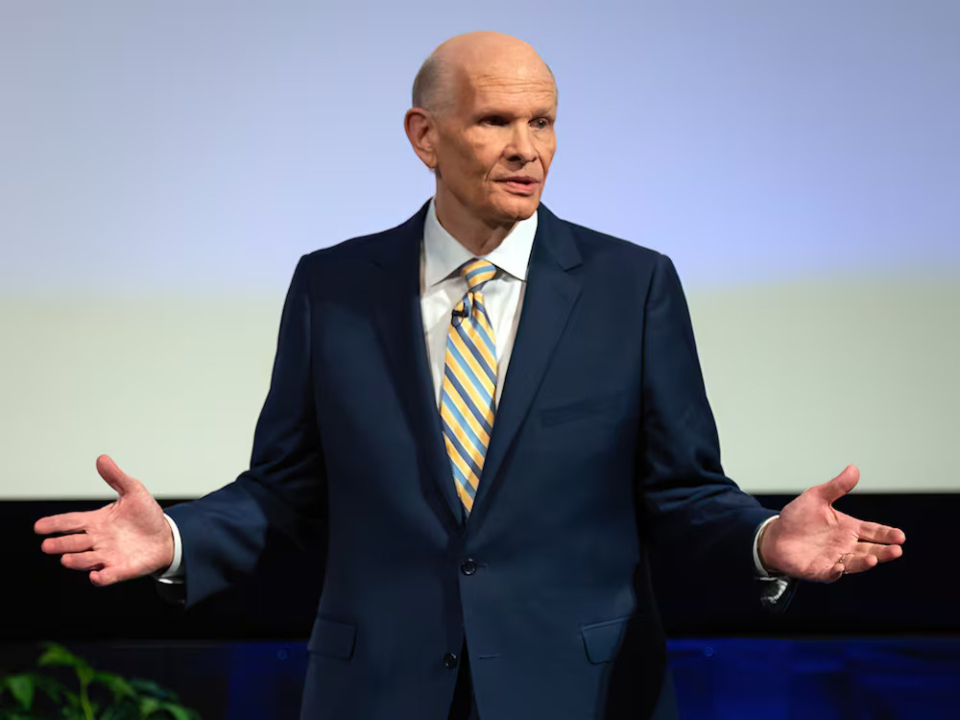
renlund-ces-educators-conference-1.jpg
Elder Dale G. Renlund of the Quorum of the Twelve Apostles speaks during his keynote address for the first Religious Educators Conference held at the Joseph Smith Building on the Brigham Young University Campus in Provo, Utah, on Tuesday June 18, 2024. Photo by Adam Fondren, courtesy of Church News.Copyright 2024 Deseret News Publishing Company.This story appears here courtesy of TheChurchNews.com. It is not for use by other media.
By Rachel Sterzer Gibson, Church News
During a general conference address in 1998, then-Elder Jeffrey R. Holland of the Quorum of the Twelve Apostles taught of how “superior teaching” in The Church of Jesus Christ of Latter-day Saints must be revitalized and reenthroned.
“When crises come in our lives, … the philosophies of men interlaced with a few scriptures and poems just won’t do,” Elder Holland said. “Are we really nurturing our [students] … in a way that will sustain them when the stresses of life appear? Or are we giving them a kind of theological Twinkie — spiritually empty calories?” (“A Teacher Come From God,” April 1998 general conference).
In addressing religious educators throughout the worldwide Church on Tuesday, June 18, Elder Dale G. Renlund of the Quorum of the Twelve Apostles reiterated Elder Holland’s words, cautioning against “spiritual malnutrition.”
He declared, “A teacher who has faith, and teaches faith, is critical in The Church of Jesus Christ of Latter-day Saints, especially for the rising generation.”
Elder Renlund offered the keynote address of the first-ever Religious Educators Conference sponsored by the Church Educational System on Tuesday. The event marks the first time religious educators have gathered together from all of the CES entities — Seminaries and Institutes of Religion, BYU, BYU–Idaho, BYU–Hawaii, Ensign College and BYU–Pathway Worldwide. “In total, these religious educators teach roughly half a million young adults across CES,” noted Elder Clark G. Gilbert, a General Authority Seventy and the Church commissioner of education, in his introductory remarks.
The conference — originating from the Brigham Young University campus in Provo, Utah — was livestreamed at CES.ChurchofJesusChrist.org and will be published in Gospel Library and Media Library in 41 languages in upcoming days.
In addition to the remarks of Elder Renlund and Elder Gilbert, the daylong conference included sessions by Brother Chad H Webb, the administrator for Seminaries and Institutes of Religion, who will begin his service as First Counselor in the Sunday School General Presidency in August; the presidents of each of the CES institutions; and other Church educators and program administrators.
In his address, Elder Renlund noted that a person who ate nothing but Twinkies — a snack consisting of vanilla cake and a soft cream center that is devoid of fiber, calcium or Vitamin A or C — would become a constipated, osteoporotic blind person with scurvy. “It is not a pretty sight,” Elder Renlund said.
In the same way that individuals physically need nutrient-rich foods, students need to be spiritually nourished with the good word of God. “Those nourished with spiritual Twinkies are unlikely to become lifelong disciples of Jesus Christ,” Elder Renlund said, adding, “They are more likely, instead, to grow up to be spiritually stubborn, faithless and bewildered.”
The Apostle then shared four “nutrient-enriched” metaphorical staples all students need in order to combat spiritual malnutrition.
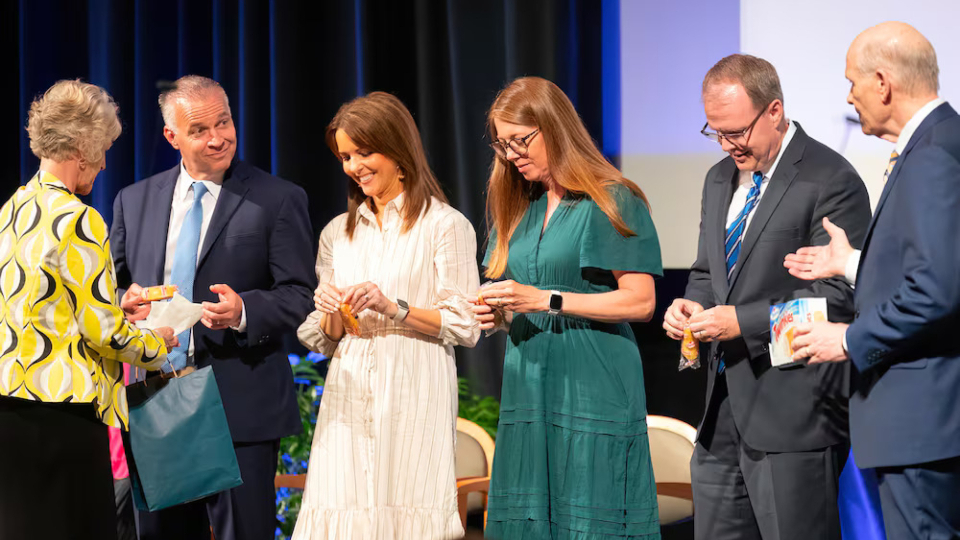
renlund-ces-educators-conference-2.jpg
During Elder Dale G. Renlund's keynote address, Sister Ruth Renlund passes out Twinkies to BYU President C. Shane Reese, Sister Wendy Reese, Sister Melinda Ashton and BYU–Pathway President Brian Ashton to illustrate spiritual malnutrition. Elder Renlund spoke during the first-ever Religious Educators Conference held at the Joseph Smith Building on the Brigham Young University Campus in Provo, Utah, on Tuesday, June 18, 2024. Photo by Adam Fondren, courtesy of Church News.Copyright 2024 Deseret News Publishing Company.Gospel Nutrient #1: A Firm Testimony
The first vital gospel nutrient students need is a firm testimony, Elder Renlund said — “of Heavenly Father and His plan, Jesus Christ and His Atonement, and the Restoration of the fullness of the gospel of Jesus Christ in these latter days.”
For this to happen, educators must teach restored truth and bear testimony of these truths.
As an example, Elder Renlund shared about inviting a family friend, Grace, who was not a member, to a Christmas sacrament meeting program many years ago. As the stake president at the time, Elder Renlund sat on the stand while his wife and daughter sat with Grace.
Two speakers shared sentimental but fictitious Christmas stories. The bishop, however, took five minutes to bear powerful testimony of Jesus Christ.
During the closing hymn, Grace leaned over to Sister Renlund and noted that when the bishop spoke, something felt different.
“The speakers had been well meaning but had served up theological Twinkies, spiritually empty calories, anemic expressions of faith and testimony that were devoid of the power of the word of God and consequently of the Spirit,” Elder Renlund said.
Noting that it is difficult for the Spirit to bear witness of a fictitious story, Elder Renlund reminded teachers of the need to always bring their instruction back to Jesus Christ and His Atonement, Heavenly Father and His plan, and the Restoration of the gospel. “Of course, it is fine to use stories, even fictitious ones, to grab the attention of students, ... but once we have their attention, we then need to deliver the nourishment that changes lives.”
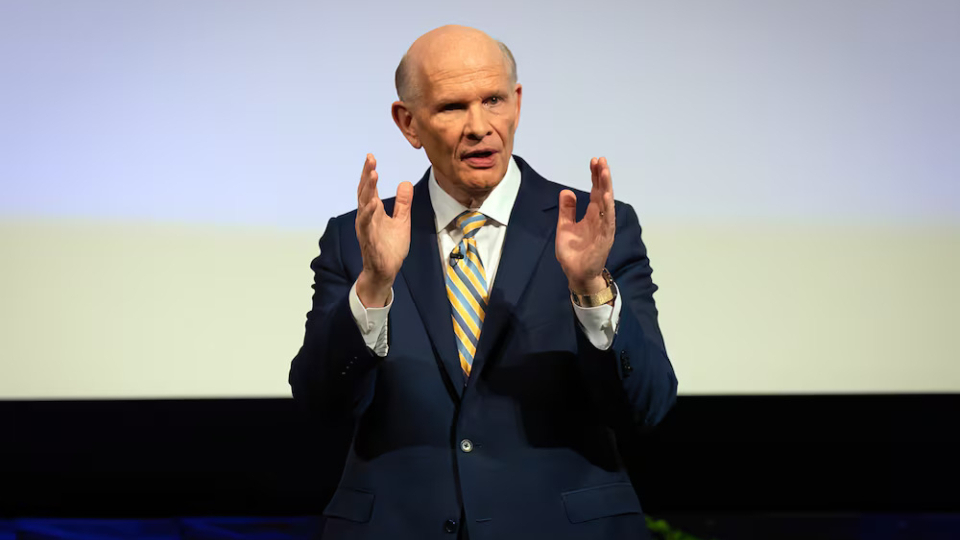
renlund-ces-educators-conference-3.jpg
Elder Dale G. Renlund of the Quorum of the Twelve Apostles speaks during his keynote address during the first-ever Religious Educators Conference held at the Joseph Smith Building on the Brigham Young University Campus in Provo, Utah on Tuesday June 18, 2024. Photo by Adam Fondren, courtesy of Church News.Copyright 2024 Deseret News Publishing Company.Gospel Nutrient #2: A Personal Relationship With the Teacher
A personal relationship with a teacher can facilitate students’ being drawn to the Savior, who is the real source of spiritual nutrition, Elder Renlund said.
“The relationship between teacher and learner helps learners be open to His words. Even years after your formal teaching of students ends, your relationship can continue to exert a positive influence in their lives. Your lasting influence will be because you have, out of deep love and concern for their welfare, pointed them to the Lord and His doctrine, rather than to yourselves.”
Elder Renlund spoke of one of his Primary teachers, Becky, who taught and encouraged him not only as a child but as a youth, as a newly returned missionary and even after his call to the Twelve.
“Each student needs one or more Beckys in their lives, teachers who have a lifelong relationship with them, someone who has pointed them to the Savior, someone who affects their thinking and behavior, someone they do not want to disappoint,” Elder Renlund said.
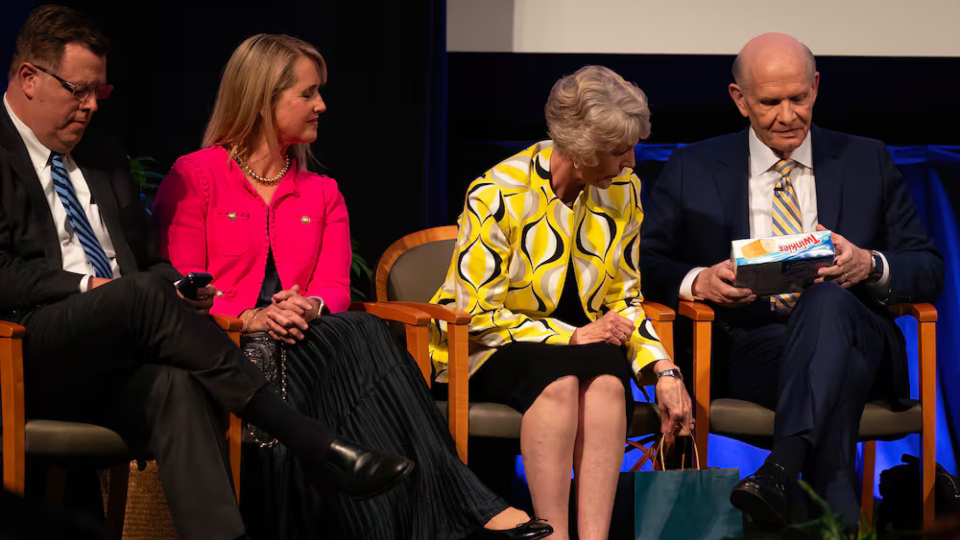
renlund-ces-educators-conference-4.jpg
Elder Dale G. Renlund of the Quorum of the Twelve Apostles holds a box of Twinkies in preparation for his keynote address during the first-ever Religious Educators Conference held at the Joseph Smith Building on the Brigham Young University Campus in Provo, Utah, on Tuesday, June 18, 2024. Photo by Adam Fondren, courtesy of Church News.Copyright 2024 Deseret News Publishing Company.Gospel Nutrient #3: The Need to Address Questions and Concerns
“Teachers, you can help your students by teaching them what it means to combine study and faith as they learn,” Elder Renlund said. “You can teach them by modeling this skill and approach in class.”
Students will observe how a teacher responds to the tough questions; dodging or ignoring honest questions will raise more questions, Elder Renlund noted.
The Church has compiled “a wonderful, trustworthy resource for individuals seeking answers to their own questions and for others who are striving to help them. Our goal is to help strengthen faith in Jesus Christ, even as we provide some suggestions for how to approach complex and sometimes difficult topics.”
Elder Renlund then introduced resources found on ChurchofJesusChrist.org and the Gospel Library app. Under “Topics and Questions” is a section called “Seeking Answers to Questions” and another section called “Helping Others With Questions.”
The “Seeking Answers to Questions” section teaches principles that can guide study as individuals seek to answer questions — whether about faith, doctrine or Church history.
This section encourages individuals to center their lives on Jesus Christ, Elder Renlund explained. “We are reminded that God’s plan of salvation provides perspective for our questions. That perspective helps us distinguish core gospel truths from things that are not as essential.”
The section also encourages individuals to be patient and trust in the Lord’s timing, Elder Renlund continued. “As we search for answers, we should seek guidance from the Holy Ghost and work to understand the past by placing things in context.”
The “Helping Others With Questions” section shares principles to those seeking to help those with questions. “No matter what, we should speak respectfully, listen with empathy and demonstrate Christlike love. So, listen and respond with love. Seek to understand, acknowledge the experience others have, and avoid being dismissive or judgmental,” Elder Renlund said.
He reminded listeners that although they have the fullness of the gospel, they do not have the answers to all questions. “Some answers will have to wait for further revelation.”
A trap many teachers may inadvertently fall into is to give reasons or explanations that the Lord has not given. “It is better to say that we do not know than it is to fabricate a reason or explanation. Faith is, after all, a choice, and sometimes the only answer is to rely on faith in the Lord Jesus Christ and faith in the Restoration of the gospel, and to be patient in waiting for answers from the Lord when He chooses to reveal them.”
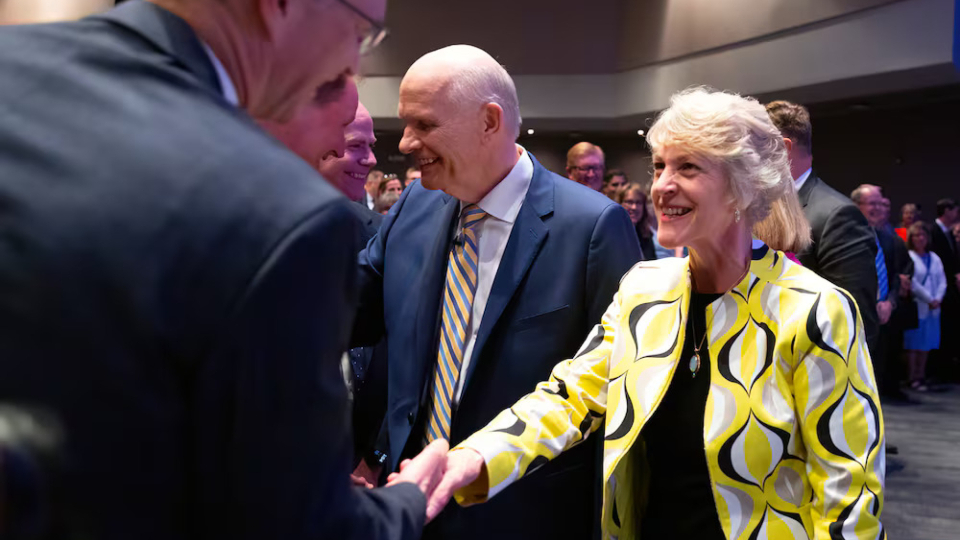
renlund-ces-educators-conference-5.jpg
After his keynote address, Elder Dale G. Renlund of the Quorum of the Twelve Apostles and his wife, Sister Ruth Renlund, shake hands with attendees of the first-ever Religious Educators Conference held at the Joseph Smith Building on the Brigham Young University Campus in Provo, Utah, on Tuesday June 18, 2024. Photo by Adam Fondren, courtesy of Church News.Copyright 2024 Deseret News Publishing Company.Gospel Nutrient #4: Create and Maintain a Soft Heart
A soft heart is one that is sensitive to the Spirit, Elder Renlund said. “A hard heart, the opposite of a soft heart, is spiritually fatal.”
Elder Renlund, who was a physician by profession, explained that a stiff or hard heart has difficulty filling with blood, which can lead to heart failure. “In the same way that a hard heart has a difficult time filling with blood, a spiritually hard heart has a difficult time filling with the Spirit.”
In 2 Nephi 33:1-2, Nephi explained how people who harden their hearts will not let the Spirit transport the words of God into their hearts. “But behold, there are many that harden their hearts against the Holy Spirit, that it hath no place in them; wherefore, they cast many things away which are written and esteem them as things of naught.”
King Benjamin summarized how to create and maintain a soft heart, Elder Renlund taught, when he declared that individuals must “always remember that redemption comes only because of Jesus Christ, that without Him our situation is hopeless. That prompts us to humble ourselves. That motivates us to pray daily, and to stand firm in our faith in Jesus Christ and His Atonement. The natural consequence is that we will ‘always rejoice, and be filled with the love of God, and always retain a remission of [our] sins; and … grow in the knowledge of the glory of him that created [us]’” (Mosiah 4:12).
In conclusion Elder Renlund invited teachers to do a self-inventory of their teaching by asking the following questions:
- “Is my teaching centered on Jesus Christ?
- “Do I teach with testimony and love?
- “Do I seek to develop lifelong relationships with my students?
- “Do I help students answer their own questions and not leave them with more questions?
- “Do I show an example of a soft heart, expressing gratitude to God and standing firm in the faith?
- “What are my students learning from my example as well as my teaching?”
Copyright 2024 Deseret News Publishing Company.
Related Content
- Religious Educators Conference: How Church Education Is a ‘Sleeping Giant in the Church’
- Guiding Principles to Help Answer Gospel Questions
Language Versions of This Article
Spanish . Portuguese . French . Italian . German . Russian . Korean . Japanese . Chinese (traditional)